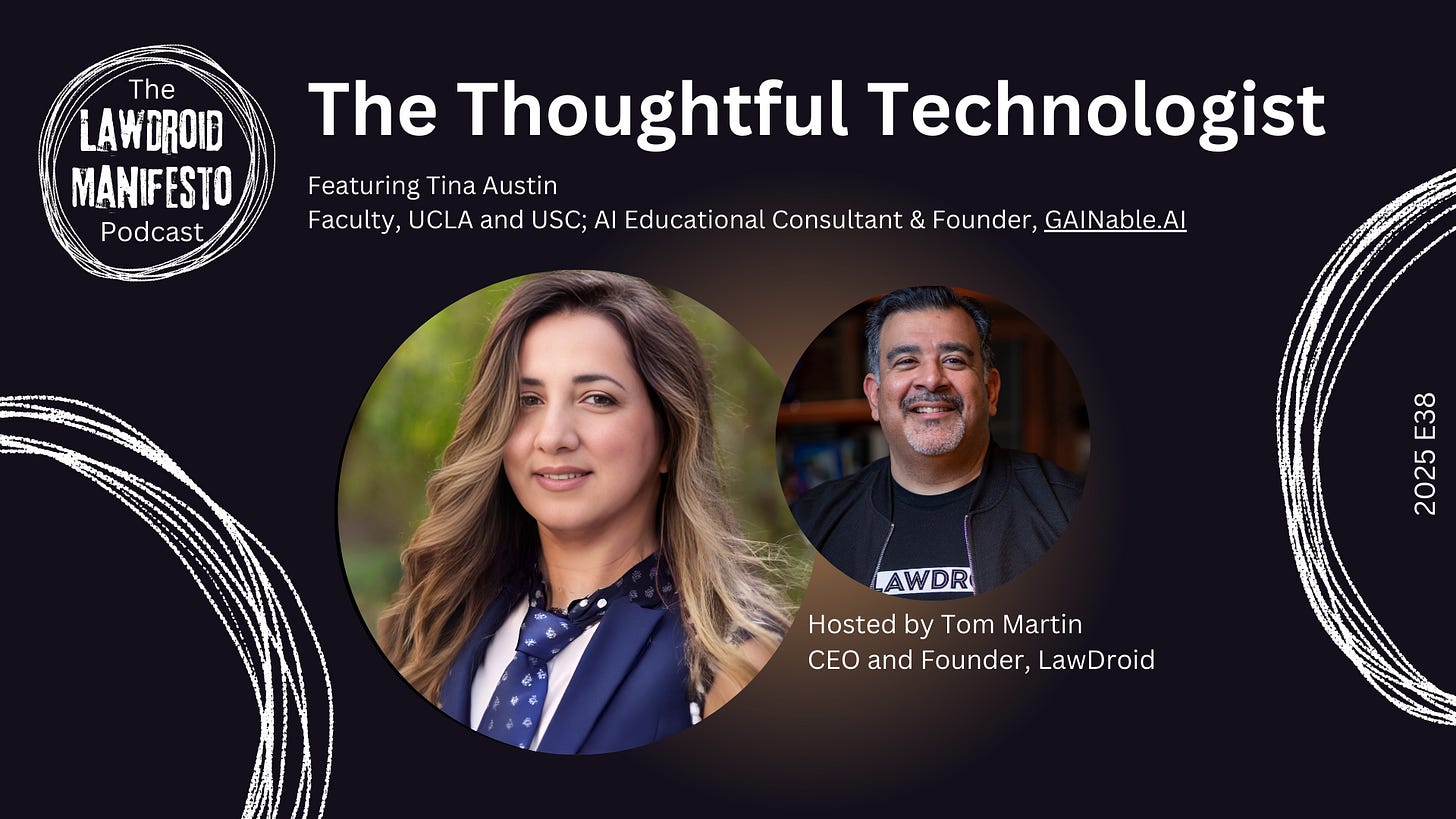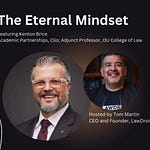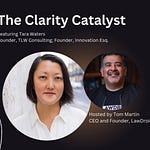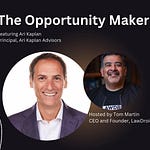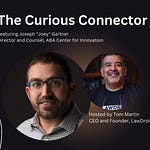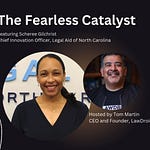Where I interview Tina Austin, AI ethics advocate and educator, teaching at both USC and UCLA and AI Educational Consultant & founder at GAINable.AI, whose talent for making complex AI concepts accessible has helped students and faculty critically evaluate AI while preparing for tomorrow.
Hey there Legal Rebels! 👋 I’m excited to share with you the 38th episode of the 2025 season of the LawDroid Manifesto podcast, where I will be continuing to interview key legal innovators to learn how they do what they do. I think you’re going to enjoy this one!
If you want to understand how to think critically about AI in education and see how educators are preparing students for an AI-enhanced future, you need to listen to this episode. Tina is at the forefront of AI education and ethics, bringing a uniquely accessible approach to making complex concepts understandable for diverse audiences.
Transforming AI Education Through Critical Thinking
Join me as I interview Tina Austin, AI ethics advocate and biomedical research educator teaching at both USC and UCLA.
In this insightful podcast episode, Tina shares her journey from biomedical research to becoming a leading voice in AI education and ethics. She dives deep into how she’s helping students and faculty critically evaluate AI tools, from protein language models to creative applications. Tina also demonstrates her innovative “Unblooms” method for reimagining education in the age of AI, moving beyond traditional pedagogical approaches to embrace new ways of learning.
Her stories and insights underscore her practical approach to AI education, including her work on AI bias detection and her experiments with tools like Notebook LM that revealed surprising gender dynamics in AI-generated content. This episode is a must-watch for anyone curious about the intersection of education and AI, offering valuable perspectives on preparing students for tomorrow’s job market.
The Skinny
Tina Austin, AI ethics advocate and educator at USC and UCLA, shares her remarkable journey from Northern Ireland through biomedical research to becoming a leading voice in AI education. With a background that spans multiple disciplines, Tina demonstrates how she’s helping students and faculty navigate the complex landscape of artificial intelligence through critical evaluation and hands-on experimentation. Throughout the conversation, Tina emphasizes the importance of understanding AI’s capabilities and limitations, highlighted by her innovative classroom experiments that reveal bias in AI systems and her development of the “Unblooms” method for education. Her approach stems from a lifelong ability to adapt to change and translate complex concepts for diverse audiences, making her uniquely positioned to guide others through the AI revolution in education.
Key Takeaways:
• Tina’s ability to make complex AI concepts accessible comes from her background in biomedical research and experience translating between different disciplines and audiences
• Her childhood in Northern Ireland, moving frequently and learning to adapt to different environments, prepared her for the constant change required in AI education
• Teaching at both USC and UCLA simultaneously while developing new courses demonstrates the high demand for AI literacy education across institutions
• Her “Unblooms” method reimagines Bloom’s taxonomy for the AI age, recognizing that traditional educational hierarchies need updating when AI can perform many cognitive tasks
• Student experiments revealed concerning trends, including 25-30% using AI as emotional companions, highlighting the need for critical AI literacy
• Protein language models represent AI applications beyond creative tasks, showing how AI impacts scientific research and discovery
• The key to effective AI education is having students evaluate AI outputs rather than just consume them, developing critical thinking skills essential for the future
• Faculty workshops are crucial because educators need support to integrate AI thoughtfully rather than prohibitively
Notable Quotes:
“My background, as you mentioned to your audience, it was biomedical research and deconstructing papers for my audience. So my students at the time, we’d bring in a paper, we’d dive into the details and break it down for them.” - Tina Austin (04:12-04:25)
“One thing led to another. And as I mentioned last quarter, it got to a point where I was, while teaching at UCLA, I got some classes to teach at USC and develop a new course and now developing more faculty workshops because there’s such a need for this right now.” - Tina Austin (05:38-05:52)
“I had to learn different accents, and you saw with one of my experiments, I tested AI with different accents. I had a Northern Irish accent when I was a kid because my parents, they were studying at the time there, and so I had to, I really wanted to blend in and wanted to be like the other kids.” - Tina Austin (12:15-12:30)
“One of the things I recently came up with to solve this problem was this Unblooms method that I’m sure you saw I posted about as well. If you’re familiar with Bloom’s taxonomy, right? It’s a step-by-step way to help someone who’s doing lesson planning to go from understanding and then all the way you go up to critical thinking at the top where you create. And now in the day and age of AI, AI kind of does all that or some of that for you.” - Tina Austin (35:45-36:10)
“One of the other things that AI can’t really do well is evaluate AI. So we had students evaluate the responses that AI gave and reflect on it.” - Tina Austin (37:22-37:32)
“I was surprised actually when I did a survey in my class of 160 students to see how many students are using AI as a companion. And it was shocking that I still had about 25 to 30%.” - Tina Austin (39:15-39:28)
“What makes it worthwhile is knowing that you’ve been able to help even one person or two do something differently and it helped them. So workshops, faculty come back at the end and say, wow, that really changed my thinking in my course and now I’m able to do this differently.” - Tina Austin (45:20-45:35)
“It’s really important to give yourself time to really reflect on these developments. And I find that that’s the important part, the nuance, the detail. And if you’re just filling up your calendar with multiple, let’s say, teaching commitments or jobs, you may miss out on those small things.” - Tina Austin (42:45-43:00)
Clips
The Brain Rot Myth Isn’t What You Think
The Truth Behind the AI Brain Rot Hype
How Unblooms Could Revolutionize Teaching
AI Isn’t Just for Catching Cheaters
Tina’s journey reflects the evolution of education itself—from traditional lecture-based teaching to AI-enhanced critical thinking approaches that prepare students for an uncertain future. Her perspective combines the analytical rigor of a trained scientist with the adaptability of someone who learned early to navigate change and translate complex ideas for different audiences. This unique combination allows her to approach AI education practically while maintaining the critical evaluation skills needed to guide others responsibly.
What stands out most is Tina’s emphasis on teaching students to evaluate AI rather than simply use it, developing the critical thinking skills that will serve them regardless of how technology evolves. By implementing this approach across two major universities and extending it to faculty development, she’s demonstrating how AI education can prepare learners for tomorrow’s challenges.
Closing Thoughts
As someone who’s spent years exploring the intersection of technology and education, I find Tina’s approach particularly compelling. She represents what I believe is the future of AI education—educators who don’t just teach about AI but help students develop the critical thinking skills needed to navigate an AI-enhanced world responsibly.
What excites me most is seeing how she’s tackled the fundamental challenge of education in the AI age. Her “Unblooms” method recognizes that traditional educational frameworks need updating when AI can perform many cognitive tasks, but rather than abandoning structure entirely, she’s creating new frameworks that emphasize human judgment and critical evaluation.
For our Legal Rebels community, Tina’s story offers valuable insights into preparing for professional practice in an AI-enhanced world. The critical thinking skills she’s developing in her students, the ability to evaluate AI outputs, understand bias, and maintain human judgment, are exactly what lawyers need as AI becomes more prevalent in legal practice.
As AI continues to reshape education and professional practice, those who approach it with Tina’s combination of scientific rigor and adaptive thinking will be best positioned to thrive. The future belongs to those who can teach others not just to use AI, but to think critically about it, ensuring that human wisdom guides technological capability.



